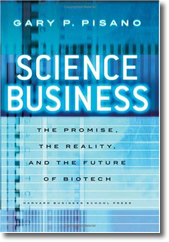Book Review: Science Business

Pisano, Gary P. Science business : the promise, the reality, and the future of biotech. Harvard Business School Press, 2006.
Editor’s Note: Guest Reviewer Randall Mayes reviews an older book for our blog this week. But as he points out in his review, the issues raised by Pisano regarding the biotech industry boom are especially relevant in light of today’s uncertain economic climate.
In 2006, Harvard Business School professor and business analyst Gary Pisano wrote Science Business as a case study of the biotechnology industry. The significance of the book is more important today than when it was originally written. At the time, the economy was doing well, so who was asking questions?
Biotechnology is defined as new era in drug discovery which began in 1976 with the use of genetic engineering distinguishing it from when researchers used various other techniques. Although as a whole the biotechnology industry has done well revenue wise since its inception, actually only a few companies are profitable. Consequently, Pisano claims the biotech boom should not have occurred. This phenomenon presents a situation now known as the “Pisano Puzzle.”
After analyzing the biotech sector, Pisano has concerns with the biotech sector’s ability to adapt to other successful business models due to several factors. First, you have risk management with known unknowns which science can deal with; however, it is the unknown unknowns that are problematic. Second, is the integration of knowledge verses specialization. Biotech firms leverage knowledge between sectors through conferences and publications, but Pisano claims the flow of information is impeded by intellectual property and non-published clinical trials data. Third, after this thirty year old experiment we call biotechnology, we are still in the learning phase. As a result, we are currently experiencing a genomics bubble.
Science Business has subsequently set off a series of studies. To find answers to the puzzle, researchers have followed the money. One interesting finding is that with the promise of high returns, biotech start-up companies are purchased by private equity firms and through public equity (IPOs and stocks) before drugs are developed. The other major finding is that the government is footing the bill for basic science that private companies use. Private companies have no incentive to invest in basic research since the laws of nature are not patentable.
The economy is dependent upon the high-tech sector for growth, maintaining our standard of living and international competitiveness, solving major world problems, and paying off our huge deficit. Are the current business strategies for biotechnology and its current financing methods sustainable or is a biotech bubble looming? Before answering this question, I recommend reading Science Business.
Randall Mayes is a Senior Fellow with Statistical Assessment Services at George Mason University, a policy analyst, a Duke Alumni, and author of “Revolutions: Paving the Way for the Bioeconomy” scheduled for release in spring 2012 from Logos Press.
© Reviewer: Randall Mayes & Ford Library – Fuqua School of Business.
All rights reserved.
Tags: Case studies, Technology